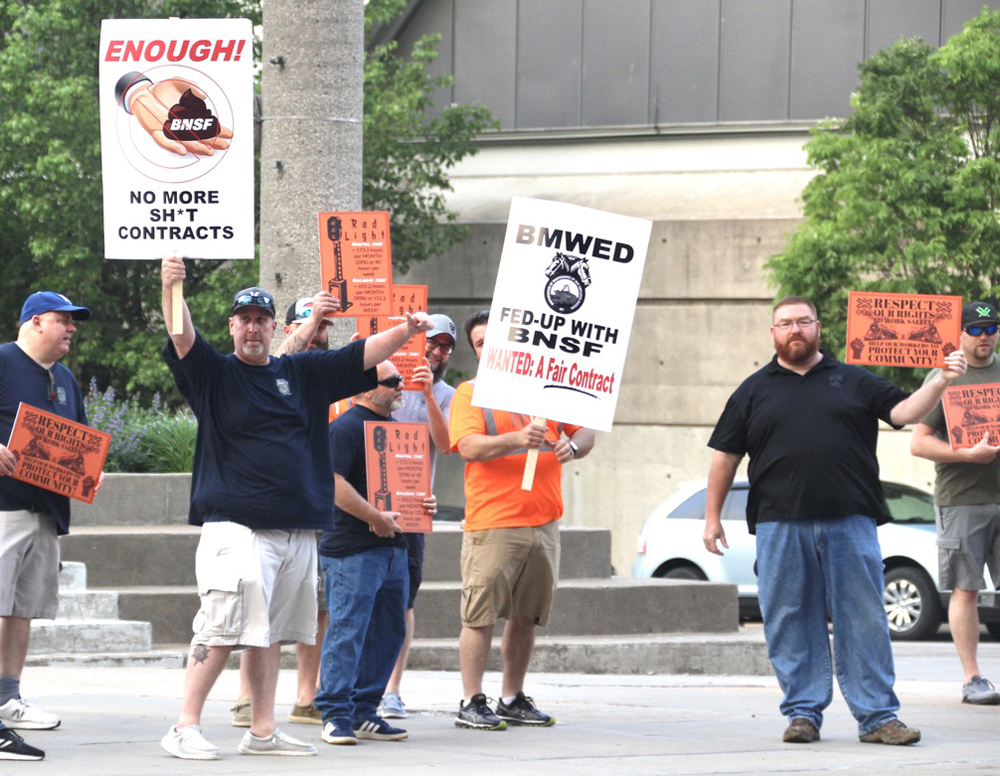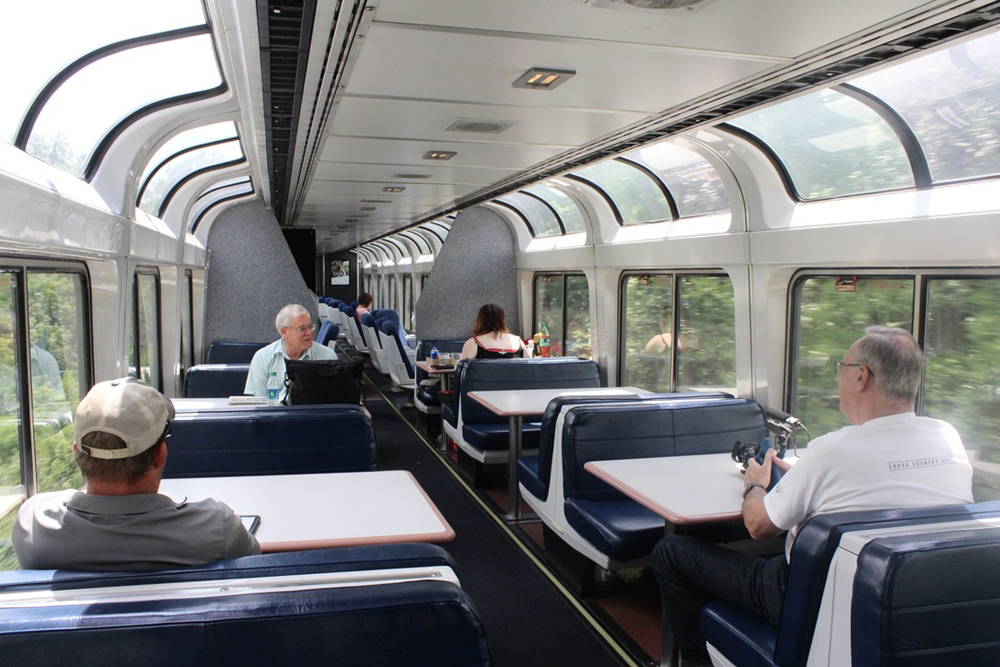
Engineers and conductors have rendered a split decision in their respective union votes over the tentative agreements reached with the U.S. Class I railroads, the unions said this morning.
By the slimmest of margins, conductors represented by the SMART-TD union rejected the deal, fueling the prospects of a nationwide strike that could begin as soon as Dec. 9. Some 50.87% of voting members rejected the agreement.
Yet the Brotherhood of Locomotive Engineers and Trainmen ratified their agreement, as did yardmasters represented by SMART-TD. Some 53.5% of engineers backed the deal, along with 62.4% of yardmasters.
Turnout was a record for both unions, reflecting the contentious relationship between railroads and the rank and file.
SMART-TD will enter a cooling-off period and resume negotiations with the National Carriers Conference Committee that represents the railroads.
“SMART-TD members with their votes have spoken, it’s now back to the bargaining table for our operating craft members,” said SMART-TD President Jeremy Ferguson. “This can all be settled through negotiations and without a strike. A settlement would be in the best interests of the workers, the railroads, shippers and the American people.”
The cooling off period runs through Dec. 8, making Dec. 9 the earliest the union could strike or railroads could lock out employees.
“The ball is now in the railroads’ court. Let’s see what they do. They can settle this at the bargaining table,” Ferguson said. “But, the railroad executives who constantly complain about government interference and regularly bad-mouth regulators and Congress now want Congress to do the bargaining for them.”
The railroads remain willing to enter agreements that are based on the recommendations of the Presidential Emergency Board, the NCCC said today.
BLET and SMART-TD — the largest of the dozen unions representing railroad workers — were the final two organizations to announce their vote tallies. Four unions have now rejected their tentative agreements, while the other eight unions have ratified their contracts.
If any one of the four unions calls a strike, it would effectively shut down the U.S. freight rail system, most Amtrak service, and many commuter lines, because the rank and file of the other unions would not cross picket lines.
“We stood shoulder to shoulder with our brothers and sisters in SMART-TD and others in rail labor throughout this process, and we will continue to stand in solidarity with them as we approach the finish line in this round of negotiations,” BLET President Dennis Pierce said.
The BLET and SMART-TD tentative agreements were based on the recommendations of the Presidential Emergency Board that was convened over the summer after railroads and unions failed to reach settlements in negotiations that began in 2020.
“Today, the BLET joined the majority of our unions in approving the largest wage increases in nearly five decades and also paved a path toward greater scheduling predictability for its members,” said Association of American Railroads CEO Ian Jefferies. “Railroads stand ready to reach new deals based upon the PEB framework with our remaining unions, but the window continues to narrow as deadlines rapidly approach. Let’s be clear, if the remaining unions do not accept an agreement, Congress should be prepared to act and avoid a disastrous $2 billion a day hit to our economy.”
All of the tentative agreements increase wages by 24% during the five-year period from 2020 through 2024, with a 14.1% increase effective immediately. The agreements also include five $1,000 annual lump sum payments, adjustments to health care premiums, and health benefit enhancements, and an additional personal leave day for all employees.
A portion of the wage increases and lump sum payments are retroactive, resulting in more than $11,000 on average in immediate payouts to employees.
But the unions that rejected their deals have said that working conditions were more important to their members than the size of their raises. The PEB did not make any recommendations on working conditions, saying they should be negotiated at the local level.
The unions representing maintenance-of-way employees, signalmen, and boilermakers also have rejected their tentative agreements. BLET, SMART-TD, and the Brotherhood of Maintenance of Way Employes have sought additional paid sick time for their members.
The railroads have rejected union requests for additional paid time off, saying employees already have paid sick time benefits. “The structure of these benefits is a function of decades of bargaining where unions, including BMWED, have repeatedly agreed that short-term absences would be unpaid in favor of higher compensation for days worked and more generous sickness benefits for longer absences,” the NCCC has said.
The last nationwide labor-related shutdown was a brief lockout in 1992.
Should the unions strike or the railroads initiate a lockout, Congress is expected to intervene as it historically has done. But some observers are concerned it could take longer than usual due to the lame-duck session in a hyperpartisan era that has bitterly divided Congress.
Railroad shipper groups have all urged Congress to act quickly. A shutdown of the freight rail network would have significant economic impacts, contribute to inflation, and potentially plunge the economy into a recession, they said.
A railroad shutdown would exacerbate agricultural shipping challenges, which include rail congestion on the big four U.S. systems, record low water levels that have brought Mississippi River barge traffic to a halt, and a shortage of trucks, the National Feed and Grain Association and 192 other members of the Agricultural Transportation Working Group told Congress earlier this month.
Even if a strike is averted before the Dec. 9 deadline, the railroads are likely to begin curtailing certain types of traffic — such as shipments of hazardous materials — as soon as Nov. 28, the American Chemistry Council says.
Shippers are also likely to divert freight to highways in advance of the strike deadline, as they did before tentative agreements were reached in September.
The tentative agreements were announced on Sept. 15, just hours before the unions could have walked out. The agreements were the result of 20 hours of negotiations between the railroads and the unions representing engineers, conductors, and signalmen.
The two sides were able to reach a deal during 20 hours of talks held at the Department of Labor headquarters in Washington, D.C., with members of the Biden administration playing a key role in the negotiations.
More than 30 U.S. railroads are covered under national bargaining. Canadian Pacific is not part of the national contract; it negotiates separately with unions representing its U.S. workers.














Oh yeah, and now the conductors hand over to the railroads a reason to ask for something they greatly want… One person crews. Smart guys, smart!
“Let’s be clear, if the remaining unions do not accept an agreement, Congress should be prepared to act and avoid a disastrous $2 billion a day hit to our economy.”
This is true. Its no longer a labor issue. Its a national security issue. Biden now needs to grow a pair and force labor to accept what is basically a good deal. If its is not about life issues as some here have pointed out, then all thoughts of a strike under the current economic situation needs to be quashed and the minority of unions (4) accept what the other eight have agreed too.
This whole railroad situation is getting to be a joke. And its not a very funny one!
the eight unions are basically regular hours jobs and they are a small number of members compared to MOW, T&E the ones critical to operations
Frankly I’m surprised the engineers ratified it as they were the most vocal in opposition at least in my terminal ,and although there are good points in this contract there are very many that aren’t addressing what people were looking for. As for the conductors we will see what happens and if they get anything else there are me to clauses in all the contracts. The conductors side almost passed as the margin between pass and fail were only like 3% so it was close to. As for your comments mr mcfarlan about many single men out there that would work these jobs happily is yet to be seen. The loner type you refer to generally aren’t very good railroaders as they lack social skills that are needed in an environment that interacts heavily with not only your coworkers but also supervisors and many of those types are to timid to be able to be around the equipment that we work around every day. I’ve seen the type and they don’t last a minute.
This shows that there is no unity in the unions… some of the 12 unions agreed to the new contracts while others rejected it. If change is to come or to force the railroads to change their stance, there must be a unified front from all the unions to force the issue and strike Nobody wants to strike but drastic and unified action is needed to effect change. They don’t make union leaders like they used to. Old time New Yorkers might remember Michael J. Quill who was head of the TWU and
gave his word and plenty of warning that he would call a transit strike in 1966 and he did. New York City endured a 12 day transit strike and in the end the city was forced to negotiate a new contract that gave the transit workers what they wanted. The TWU had a strong resolve and unified leadership and rank and file and they got what they wanted. OLd time union leaders were determined and resolved to get the benefits and rights their workers deserved and were willing to cross the line and strike for their rights and it was with one accord and unity
All for one and one for all as the saying went
Joseph C. Markfelder
Well the IDEW were purposely misled on their vote. They should be dragging their union leaders out onto the front lawn for the criminal way they made sure they got the vote that we easiest for them.
At the local level we are being told “This is the last step and if you dont vote yes we are screwed” because thats the talking pint the nation is giving them.
I have told them ” No the last step is a walkout if Congress tries to push anything”. The blame is NOT with the workers as much as the normally pro-union media tries to say it is. Its with the lying, dishonest RR leadership who mysteriously has 10’s of billions to buy back their own stock but not enough to pay the employees that make them money. It’s mind boggling.
Interesting, I thought the issue wasn’t about pay but was about getting better time off for being sick and more predictable work schedules? So which is it, pay or improved benefits?
There’s enough men out there that aren’t interested in society that if offered enough money would probably take these jobs regardless of schedules and quality of life…they have no life to begin with and don’t care about being socialable(I’m referring to all the ‘incels” that populate the numerous mens movement sites and YouTube channels).
As usual you have no idea what you are talking about. Thats is literally the dumbest take on this situation I have ever heard.
Apparently, you weren’t paying attention but we HAD plenty of good employees who were purposely let go out of greed. We now can’t get people, no matter the wages, and sure as hell don’t need the type of people you suggested.
The things that we did during the pandemic to keep the country moving will be ignored by people like you but the price was heavy and its caused the current issues with manpower.
A coworker was left on his train for 20 hours two trips in a row recently. This is inexcusable and part of a much bigger issue that revolves around the horrible work conditions that are currently being allowed. It happens to all of us frequently and just kills the supply chain. Currently, we have nearly half of our long pool engineers on YO days so how much product is being moved? They are showing up for work ( obviously) but the company can’t chew gum and walk at the same time and with the manpower being decimated because of things they have done and continue to do, well its not going to get better.
Wait until the backpay checks are sent out and see how much worse it gets.
But of course, as you sit in your basement it’s the employees fault.
This is why your mental diarrhea is worthless.
The PEB basically told railroaders that they are out of luck by saying to negotiate working conditions at the local level. They have no leverage at the local level, that is why they unionized.
Railroads will always be here, but they will continue to lose customers because management thinks it is 1922 instead of 2022. Railroad operating jobs are not desireable and to continue to make them undesireable means anybody with anything on the ball will vote with their feet. That means they get steady schedules working for practically anyone else at anything. If management pushes their luck, nationalization is what awaits. Management is too greedy and stupid to see it.
Exactly.
I would be willing to bet my paycheck that it didn’t pass on the BLET side either as there is no oversight on the count and Pierce is a drunken, power-hungry fool. He just wants it to pass so he can continue to collect his nearly $500,000 a year in pay and benefits. Oh and thats not counting his kickbacks from the RR.
This is what we call lies and propaganda.
Association of American Railroads President and CEO Ian Jefferies said, “Today, the BLET joined the majority of our unions in approving the largest wage increases in nearly five decades and also paved a path toward greater scheduling predictability for its members.”
“Railroads stand ready to reach new deals based upon the PEB [presidential emergency board] framework with our remaining unions, but the window continues to narrow as deadlines rapidly approach,” Jeffries said. “Let’s be clear, if the remaining unions do not accept an agreement, Congress should be prepared to act and avoid a disastrous $2 billion a day hit to our economy.”
In no way does it pave the way for more predictability. Quite the opposite. We are having nearly daily meltdowns at NS thanks to inept management at the top and record derailments. As soon as the contract goes through they are going to go to self-sustaining pools which will make things exponentially worse and then the taxpayers and consumers will really pay the price.
The second paragraph is meant to sway the public with made-up numbers just as they have done with the contents of the contract. T&E is looking to make what they made back in the 80’s.
The companies have not said one bad thing about the PEB findings because they got even more than they expected. The workers are left out to try and if something doesn’t change in a major way it’s going to get much worse because a lot of people are just waiting on the back pay and then they are gone. Welcome to the new worker shortage caused by the RR’s endless greed.
What should i do about my Amtrak Trip on Dec 7 to 12 on Amtrak Latrobe, Pa to Philly, Pa on Amtrak 42&43??